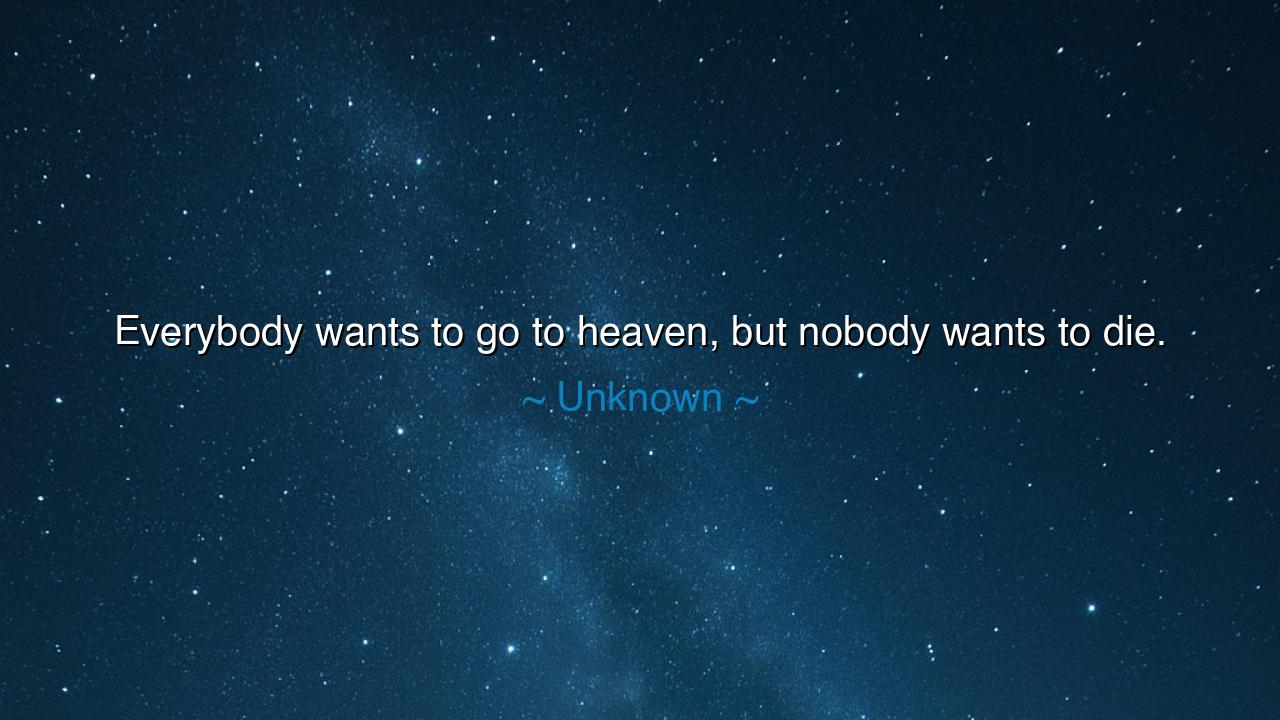
Everybody wants to go to heaven, but nobody wants to die.






“Everybody wants to go to heaven, but nobody wants to die.” — Unknown
In this timeless and piercing proverb, whose origins have been traced through sermons, songs, and the wisdom of generations, lies one of the great paradoxes of the human heart. When the unknown author said, “Everybody wants to go to heaven, but nobody wants to die,” he was not speaking only of religion — he was speaking of desire without sacrifice, of reward without struggle, of the dream of peace without the price of transformation. Heaven, in its many forms, is the symbol of all that we yearn for: happiness, salvation, perfection, the eternal good. Yet to reach it, one must pass through the narrow gate of loss — of letting go, of suffering, of death, whether literal or symbolic. And this is what most souls fear.
The origin of the phrase is uncertain, for it belongs to the people — it has been whispered from pulpits, sung in the fields, and echoed in the songs of the blues and the sermons of the South. The saying has appeared in countless tongues and traditions, for it speaks to a truth that transcends all creeds: that man desires immortality, yet trembles before the path that leads to it. In the Christian world, “heaven” is the realm of eternal life with God, but even among those who believe in its joy, there lingers an ancient dread — the fear of death, that dark passage every mortal must cross. So the saying becomes not merely a jest, but a mirror held to the soul: we love the light, but shrink from the fire that forges it.
The ancients understood this paradox well. Socrates, before drinking the cup of hemlock, told his friends that the philosopher spends his whole life learning how to die — not in despair, but in wisdom. To die, he said, is to free the soul from the body’s illusions, to awaken to truth. Yet even he confessed that the step into death required courage, for no one truly knows what lies beyond. So it is with all human striving: whether it be the death of the flesh, or the death of pride, or the death of comfort, we must surrender something of ourselves to gain something greater. But surrender is the hardest act of all.
Consider the story of Harriet Tubman, who led enslaved people to freedom along the Underground Railroad. Every journey northward was a kind of death — death to safety, to familiarity, to the known world. Many longed for freedom, for that heaven of liberty, but few were willing to risk the price. Tubman herself said, “I freed a thousand slaves, and I could have freed a thousand more if they knew they were slaves.” Her courage shows the truth of the proverb: everyone wants heaven, but not everyone will die to reach it. Freedom, like heaven, demands the surrender of fear, and the faith to step into darkness before light appears.
The saying also speaks beyond the realm of mortality — it speaks to every aspiration of the human spirit. All wish to be wise, yet few wish to endure the humility of ignorance. All wish to be great, yet few wish to endure the toil, the failure, and the solitude that greatness requires. To “die,” in this sense, is to let go of the lesser self — the comfort of the present, the illusions of safety — so that a truer self may rise. The caterpillar must die to become the butterfly; the seed must break open to become the tree. The old self must perish for the new to live.
This truth, though simple, is the cornerstone of all transformation. Heaven is not only a place beyond death — it is a state of being that awaits on the other side of every sacrifice we fear to make. When the heart longs for change, for meaning, for peace, it must also accept the death of the old ways. To cling to comfort is to remain in the shadows; to let go is to step into the eternal morning. This is why every faith, every philosophy worth its name, teaches the same lesson in different words: no resurrection without crucifixion, no victory without struggle, no heaven without the courage to die.
Lesson:
The wisdom of this ancient saying calls us to bravery. Do not fear the small deaths — the endings, the losses, the changes that life demands. Each one is a gate to heaven in its own form. Die to bitterness, and you will awaken to peace. Die to pride, and you will find love. Die to fear, and you will discover freedom. When your soul longs for something higher, do not cling to the ground beneath your feet. Remember the old truth: everybody wants to go to heaven, but few are willing to die — not because death is terrible, but because letting go requires faith. Let your faith be stronger than your fear, and you shall find, beyond every ending, a new and radiant beginning.






AAdministratorAdministrator
Welcome, honored guests. Please leave a comment, we will respond soon